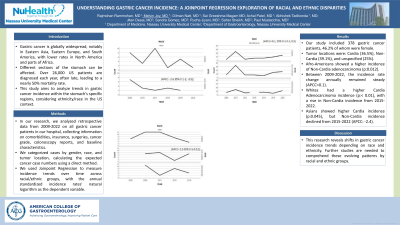Monday Poster Session
Category: Stomach
P2718 - Understanding Gastric Cancer Incidence: A Joinpoint Regression Exploration of Racial and Ethnic Disparities
Monday, October 23, 2023
10:30 AM - 4:15 PM PT
Location: Exhibit Hall

Has Audio

Melvin Joy, MD
Nassau University Medical Center
East Meadow, NY
Presenting Author(s)
Rajmohan Rammohan, MD, Melvin Joy, MD, Sai Greeshma Magam, MD, Dilman Natt, MD, Achal Patel, MD, Tulika Saggar, MD, Abhishek Tadikonda, MD, Jiten Desai, MD, Sandra Gomez, MD, Saher Sheikh, MD, Rucha Jiyani, MD, Paul Mustacchia, MD, MBA
Nassau University Medical Center, East Meadow, NY
Introduction: Gastric cancer is globally widespread, notably in Eastern Asia, Eastern Europe, and South America, with lower rates in North America and parts of Africa. Different sections of the stomach can be affected. Each year, over 26,000 US patients are diagnosed, often late, leading to a near 50% mortality rate. This study aims to analyze trends in gastric cancer incidence within the stomach's specific regions, considering ethnicity/race in the US context
Methods: In our research, we analyzed retrospective data from 2009-2022 on all gastric cancer patients in our hospital, collecting information on comorbidities, insurance, surgeries, cancer grade, colonoscopy reports, and baseline characteristics. We categorized cases by gender, race, and tumor location, calculating the expected cancer case numbers using a direct method. We used Joinpoint Regression to measure incidence trends over time across racial/ethnic groups, with the annual standardized incidence rates' natural logarithm as the dependent variable.
Results: Our study included 378 gastric cancer patients, 46.2% of whom were female. Tumor locations were: Cardia (36.5%), Non-Cardia (39.1%), and unspecified (25%). Afro-Americans showed a higher incidence of Non-Cardia adenocarcinoma (p:0.012). Between 2009-2022, the incidence rate change annually remained steady (APCC=0.1). Whites had a higher Cardia Adenocarcinoma incidence (p:< 0.01), with a rise in Non-Cardia incidence from 2015-2022. Asians showed higher Cardia incidence (p:0.045), but Non-Cardia incidence declined from 2015-2022 (APCC: -2.4).
Discussion: This research reveals shifts in gastric cancer incidence trends depending on race and ethnicity. Further studies are needed to comprehend these evolving patterns by racial and ethnic groups

Disclosures:
Rajmohan Rammohan, MD, Melvin Joy, MD, Sai Greeshma Magam, MD, Dilman Natt, MD, Achal Patel, MD, Tulika Saggar, MD, Abhishek Tadikonda, MD, Jiten Desai, MD, Sandra Gomez, MD, Saher Sheikh, MD, Rucha Jiyani, MD, Paul Mustacchia, MD, MBA. P2718 - Understanding Gastric Cancer Incidence: A Joinpoint Regression Exploration of Racial and Ethnic Disparities, ACG 2023 Annual Scientific Meeting Abstracts. Vancouver, BC, Canada: American College of Gastroenterology.
Nassau University Medical Center, East Meadow, NY
Introduction: Gastric cancer is globally widespread, notably in Eastern Asia, Eastern Europe, and South America, with lower rates in North America and parts of Africa. Different sections of the stomach can be affected. Each year, over 26,000 US patients are diagnosed, often late, leading to a near 50% mortality rate. This study aims to analyze trends in gastric cancer incidence within the stomach's specific regions, considering ethnicity/race in the US context
Methods: In our research, we analyzed retrospective data from 2009-2022 on all gastric cancer patients in our hospital, collecting information on comorbidities, insurance, surgeries, cancer grade, colonoscopy reports, and baseline characteristics. We categorized cases by gender, race, and tumor location, calculating the expected cancer case numbers using a direct method. We used Joinpoint Regression to measure incidence trends over time across racial/ethnic groups, with the annual standardized incidence rates' natural logarithm as the dependent variable.
Results: Our study included 378 gastric cancer patients, 46.2% of whom were female. Tumor locations were: Cardia (36.5%), Non-Cardia (39.1%), and unspecified (25%). Afro-Americans showed a higher incidence of Non-Cardia adenocarcinoma (p:0.012). Between 2009-2022, the incidence rate change annually remained steady (APCC=0.1). Whites had a higher Cardia Adenocarcinoma incidence (p:< 0.01), with a rise in Non-Cardia incidence from 2015-2022. Asians showed higher Cardia incidence (p:0.045), but Non-Cardia incidence declined from 2015-2022 (APCC: -2.4).
Discussion: This research reveals shifts in gastric cancer incidence trends depending on race and ethnicity. Further studies are needed to comprehend these evolving patterns by racial and ethnic groups

Figure: APCCincidence trend 2009-2019
Disclosures:
Rajmohan Rammohan indicated no relevant financial relationships.
Melvin Joy indicated no relevant financial relationships.
Sai Greeshma Magam indicated no relevant financial relationships.
Dilman Natt indicated no relevant financial relationships.
Achal Patel indicated no relevant financial relationships.
Tulika Saggar indicated no relevant financial relationships.
Abhishek Tadikonda indicated no relevant financial relationships.
Jiten Desai indicated no relevant financial relationships.
Sandra Gomez indicated no relevant financial relationships.
Saher Sheikh indicated no relevant financial relationships.
Rucha Jiyani indicated no relevant financial relationships.
Paul Mustacchia indicated no relevant financial relationships.
Rajmohan Rammohan, MD, Melvin Joy, MD, Sai Greeshma Magam, MD, Dilman Natt, MD, Achal Patel, MD, Tulika Saggar, MD, Abhishek Tadikonda, MD, Jiten Desai, MD, Sandra Gomez, MD, Saher Sheikh, MD, Rucha Jiyani, MD, Paul Mustacchia, MD, MBA. P2718 - Understanding Gastric Cancer Incidence: A Joinpoint Regression Exploration of Racial and Ethnic Disparities, ACG 2023 Annual Scientific Meeting Abstracts. Vancouver, BC, Canada: American College of Gastroenterology.
